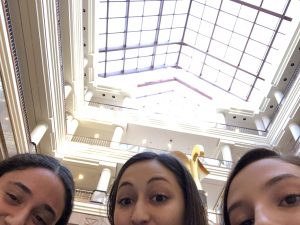
On the Wednesday afternoon of March 6, 2019, the Connecticut Education Committee met at a hearing regarding numerous bills awaiting approval. Representatives heard testimony on bills from the requirement of computer science classes in school to the possibility of a school counseling program requirement. Many representatives and officials sitting in on the hearing wore yellow flowers in support of early childhood bills. Among these bills discussed were House bills H7082 and H7083. If passed, these bills would include a more detailed Puerto Rican and African American history throughout elementary, middle, and high school curriculum across Connecticut. The majority of the public hearing testimony was in support of the bills.
Committee Chair Senator McGrory called up Howard Sovornsky, the President of the Jewish Federation of Hartford, to testify. Sovornsky referenced the effect of a similar former bill in requiring the inclusion of the Holocaust and genocide into the Connecticut curriculum. Comparing this to the current bill at debate, he noted that African American history is often mistaught or glossed over, and it needs to be mandated. Representative Miller inquired why the Holocaust and genocide bill was so important. Sovornsky replied that, “We cannot forget history. We need to know why it happened and prevent it from happening again, which is the same message as this bill is trying to achieve.”
Next, an African American student from Antonia, Connecticut spoke about her experience growing up. She noted that this bill hits at the core of racial disparities in America. She talked about how she grew up in a bubble where she believed we were past a time of racism. However, she now realizes that there is a pressing issue and there is a need to dismantle this systematic oppression. She talked about how these proposed bills would start to help bring perspective and change this. These bills would bring awareness not only to students of color like herself who grew up in a ‘bubble,’ but it would also bring light to white students who are also unaware of these present-day issues.
One former superintendent mentioned the implementation process and recommended two years for the curriculum to be fully incorporated, but supported the bills themselves, stating reasons similar to others who spoke positively of these bills.
Senator McGrory started calling names of students signed up to testify, who were not present. One woman, a teacher at HMTCA, called out that these students were coming but they did not want to miss school. In a separate conversation outside of the court room, I asked her some questions about the bill. As I had not read it closely, I asked if this bill had specific provisions for what the additional curriculum would entail. We discussed the possibility of educators missing the point if unspecified language was used in this bill. She explained that part of the reason her and her students were testifying was for this purpose of adding amendments to the bill.
A recurring theme throughout testimony was the idea that the current curriculum does not do enough. It provides a basic understanding of black history, and barely mentions Puerto Rico. Some students do not even know that Puerto Rico is a commonwealth of the United States. The current curriculum on black history goes through the hardships of slavery and the Civil War. It mentions Martin Luther King’s movement and glosses over the Brown v. Board of Education decision. However, it ties up history with a perfect bow. It does not even insinuate that inequalities may exist today. Many who testified explained that it is important to understand why these issues persist in today’s world, and these bills must be passed in order to have a fuller understanding and fix them.